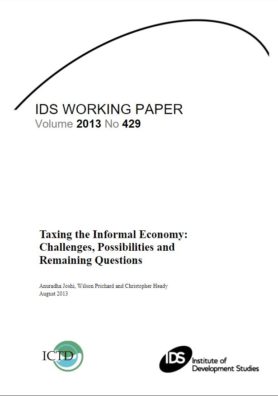IDS Working Paper 429
Recent years have witnessed significantly increased attention to the challenge of taxing small businesses in the informal sector. However, much of this recent attention has remained focused on comparatively technical issues of revenue maximisation and policy design. This paper argues that this debate should focus increasingly on the wider development implications of informal sector taxation, as well as the political and institutional barriers to improved performance. When considering the merits of committing scarce resources to taxing small informal sector firms, debate has frequently focused on limited revenue potential, high costs of collection and potentially perverse impacts on small firms. By contrast, recent arguments have increasingly emphasised more indirect benefits of informal taxation in relation to economic growth, tax compliance and governance.
